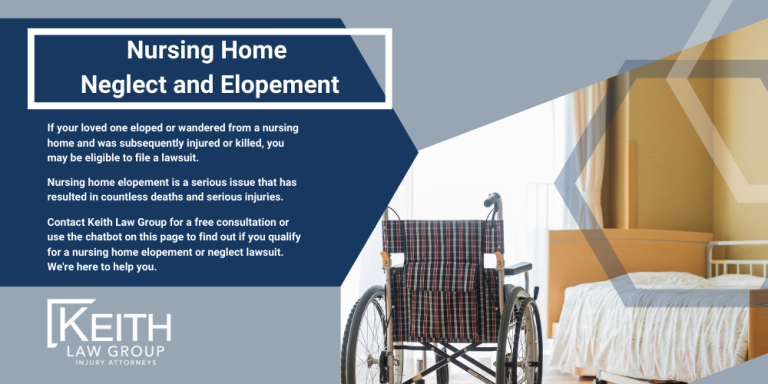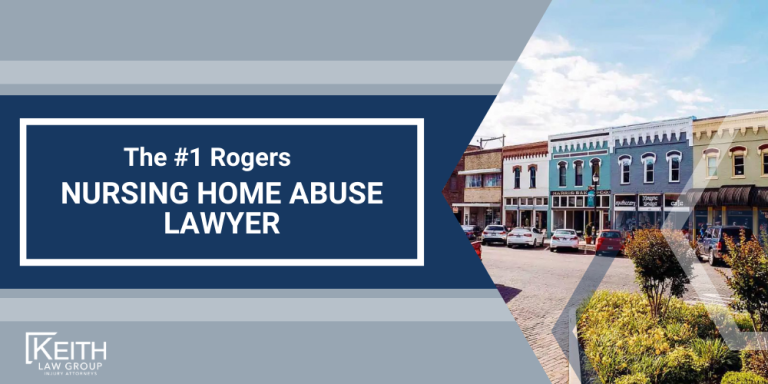- Last Updated: July 9th, 2024

Personal Injury Lawyer for 30+ years. Nationally recognized Top 100 Trial Lawyer. Top Car Accident Lawyer & Motor Vehicle Accident Lawyer in Arkansas.
- Over $20 Million recovered in Medical Device Injury Lawsuits.
- Over $13 Million recovered in Car Accident Lawsuits and other Motor Vehicle Accident Lawsuits.
- Over $100 Million recovered in total on behalf of clients.
- Sean specializes in cases involving personal injuries, car accidents, motorcycle accidents, truck accidents, wrongful death, slip and falls, nursing home abuse cases, nursing home elopement cases, and more.
Nursing Home Neglect and Elopement Risks
Nursing homes are vital in providing care and support for elderly individuals who require assistance with daily activities.
Unfortunately, instances of neglect and abuse within nursing homes are not unheard of.
One particularly concerning issue is elopement, which refers to the act of a resident leaving the facility without authorization or oversight.
Elopement can have severe consequences for the resident’s well-being, and family members need to understand the implications and potential legal actions that can be taken.
Nursing homes and assisted living facilities are bound by their responsibilities to care for and protect all the elderly patients they shelter.
In this blog post, we’ll cover nursing home neglect and elopement lawsuits, some examples of how an elderly person escapes from a nursing home facility, what you can do to hold the facility accountable for your loved one’s safety, and much more.

If your loved one or family member eloped from a nursing home and suffered serious injury or death, you may be eligible to file a lawsuit.
Contact Keith Law Group for a free consultation.
Use our chatbot to receive a free, instant online case evaluation and find out if you qualify for legal action right now.
Our law firm is staffed with expert Nursing Home Neglect Lawyers ready to help you seek justice.
Wandering patients are at extreme risk of serious injuries and death, and if a nursing home fails to provide adequate care and adequate supervision, they can be held liable in a civil lawsuit for nursing home neglect.
Reach out to our law firm for more information.
Table of Contents
What Does "Elopement" Mean in Nursing Homes?
In the context of nursing homes, elopement refers to when a resident leaves the assisted living facility or nursing home without proper consent or supervision.
Elopement is particularly concerning for several reasons.
Elderly patients who elope may be vulnerable due to physical frailty, cognitive impairment, or other health conditions.
Leaving a nursing home unsupervised can expose residents to various risks, including accidents, serious injuries, broken bones, medication errors, and even death.
As the cases of wandering elderly patients have increased, many facilities are incorporating top-of-the-line security technology to protect residents and prevent wandering.
Other nursing home facilities still remain without necessary security measures, adequate supervision, and proper staffing.
Are Nursing Homes Liable for What Happens to Escaped Nursing Home Residents?
Nursing homes have a legal duty to provide residents with a safe and secure environment.
When nursing home residents wander and suffer an injury, the nursing home or assisted living facility may be held liable for negligence.
Nursing homes are responsible for taking reasonable measures to prevent elopement and ensure the well-being of their residents.
Many reasons, like lack of workforce, inefficient security measures, inadequate security, and inattentive staff members contribute to the increasing number of escaping patients.
All of these reasons could be attributed to the facility’s lack of efforts to provide residents with quality care and a secure environment.
When a nursing home facility fails to protect residents and prevent wandering, they may be held liable in a Nursing Home Elopement Lawsuit.
Nursing Home Elopement Risks: Why Do Some Seniors Try To Escape Nursing Homes?
Several risk factors can contribute to elderly individuals attempting to escape nursing homes.
It is essential to understand these reasons to address the underlying issues effectively.
Family members must remain vigilant of their elderly loved one’s condition, making sure that facility staff members provide services and appropriate attention, psychiatric care, and other necessary medical treatment.
Nursing home staff members must also be aware of residents elopement histories, which signal that an elderly person may be at a greater risk for escaping a long term care facility.
Suffering From Dementia, Alzheimer’s Disease or Other Cognitive Impairments
Seniors with dementia, Alzheimer’s disease, or any mental impairment may experience confusion, disorientation, or a strong desire to return to a familiar place, such as their previous home.
Cognitive impairments and dementia related issues can impair judgment and make individuals more likely to elope.
For this reason, elderly patients dealing with such conditions are often checked into a special memory care unit.
These units often have complicated security protocols, expert security personnel, assistive devices, and other tactics to prevent elopement.
Dealing With Elder Abuse
Physical, emotional, or financial abuse within nursing homes can make residents feel unsafe and trapped.
In extreme cases, they may attempt to escape to protect themselves from further harm.
Abuse and neglect are among the top reasons why elderly residents decide to elope from a long term care facility.
Not Receiving the Level of Necessary Care
When nursing homes fail to provide residents with the necessary care, attention, and assistance, the elderly may feel neglected or overlooked.
Frustration with substandard care can motivate them to leave the facility for better conditions.
Regardless, it is the duty of a nursing home or long term care facility to prevent patients from wandering or eloping while also providing adequate
How Do Elder Residents Escape From Nursing Homes?
As established above, poor care and living conditions and mental confusion are the leading reasons why residents choose to escape nursing home facilities.
However, these facilities are often equipped with high-security measures, and considering the resident’s condition, it shouldn’t be easy for them to escape the care institution.
Despite protocols in place to protect residents and prevent accidents, some nursing homes are not properly staffed, do not have adequate supervision or video surveillance, and put patients at a high risk for abuse and neglect, leading to elopement risks.
Below are reasons elopement and wandering may occur.
Inattentive Staff Members
The lack of attentive and vigilant staff members can provide an opportunity for residents to leave unnoticed.
Staff should be properly trained to recognize signs of elopement risk and take appropriate actions to prevent it.
In some nursing homes, staff members may be undertrained or unqualified to take care of elderly patients that suffer from cognitive impairments, Alzheimer’s disease, or other risk factors that may lead to elopement or wandering.
Sometimes, nursing home staff members may too focused on dealing with other important tasks that they can overlook the risk of a resident trying to exit the facility.
Understaffed Nursing Home
It’s not uncommon for a nursing home facility to have one nurse look after multiple patients.
The inadequate nurse-to-patient ratio can lead to nurse fatigue and they may be unable to monitor every resident properly.
Insufficient staffing levels can strain resources and compromise the ability to monitor residents closely.
A lack of personnel increases the chances of residents eloping without being noticed promptly.
Lack of Security Personnel and Video Surveillance
Inadequate security measures, such as unlocked doors or unmonitored exits, can make it easier for residents to elope undetected.
Similarly, the absence of security cameras can hinder efforts to identify and locate eloped residents.
There are instances when nursing home residents wander aimlessly on the grounds and unknowingly escape the premises.
With no security cameras in place, it can be challenging to spot and bring them back or protect them from harm.
Ineffective Security Measures
Even if security measures are in place, their effectiveness may be compromised if they are not regularly evaluated, updated, and maintained.
Outdated or malfunctioning systems can create vulnerabilities in nursing home facilities that residents may exploit.
When a nursing home fails to secure an efficient security system, it can lead to higher rates of elopement incidents.
What Could Happen to an" Eloped" Senior Resident?
When elderly residents elope from a nursing home, they can face various risks and dangers.
It is crucial for family members and loved ones to be aware of the potential outcomes of nursing home elopement.
Nursing homes are located all across the United States, with some being rural and surrounded by woods, and others being in the center of a bustling city.
The risks of elopement include both the physical environment surrounding a nursing home, as well as the mental and physical condition of the escaped patient.
Wandering Patients May Be At Risk Of Accidents
Eloped residents may wander into hazardous situations, such as traffic or unfamiliar terrain, increasing the risk of accidents, falls, or injuries.
Elderly patients suffering from memory and attention problems may have difficulty comprehending the environment or could misconstrue the environment.
Their state of mental confusion could quickly put them in danger and cause them to sustain a serious injury.
Wandering Patients Could Be The Victim of a Crime
Criminal activities happen worldwide all the time, and there’s no telling what are the odds of an escaped elderly patient being victimized in a crime.
Elderly individuals who elope may become targets for criminals who exploit their vulnerability.
They may fall victim to theft, assault, kidnapping, or other forms of abuse.
Because of the risks of elopement, nursing home facilities need to integrate the latest and best security measures to keep their residents safe inside the facility.
Wandering Patients Can Face Deadly Situations
In severe cases, eloped residents may encounter life-threatening situations due to exposure to extreme weather conditions, getting lost in remote areas, or becoming injured and having so access to help.
Elderly individuals often have a poor sense of direction and can easily find themselves in precarious situations without proper help if they wander from an assisted living facility.
By understanding the potential risks associated with nursing home neglect and elopement, we can all work together to ensure that our elderly loved ones are monitored closely and provided with the care they need to stay safe and healthy.
What Should You Do if a Loved One Eloped From a Nursing Home?
If you discover a loved one has eloped from a nursing home, swift action is critical to ensure their safety.
Here are some steps you can take to ensure your loved one’s safety and invoke proper legal action.
- Inform the Nursing Home: If your loved one returned to your home or was found, inform the nursing home facility immediately. Ensure they know about the incident and take appropriate steps to prevent further elopements in their facility.
- Involve Law Enforcement: If your loved one has been missing for over 24 hours, it is best to contact local law enforcement. Make them aware of the situation and provide any information that may help locate your loved one.
- Talk to Local Establishments: Reach out to local hospitals, shelters, and public transportation facilities to check if the resident has been found or sought assistance.
- Consider Filing a Nursing Home Elopement Lawsuit: If your loved one has been found and you suspect negligence on the part of the facility, consider consulting with a lawyer to evaluate your case and decide whether or not you should pursue legal action.
What Type of Lawsuits Can You Bring In Nursing Home Neglect and Elopement Cases?
If a nursing home resident has suffered harm or even death as a result of elopement due to nursing home neglect, their family members may take legal action to seek justice and compensation.
Depending on the nature of the incident, family members may be eligible to file one of many different legal claims.
Types of lawsuits for nursing home neglect and elopement include the following:
Negligence-based Lawsuit
A negligence lawsuit can be filed against a nursing home if it is determined that the facility breached its duty of care by failing to implement adequate security measures or supervise residents.
Negligence-based cases cover a wide array of issues, such as abandonment and common abuse cases.
This lawsuit would compensate for the victim’s medical treatment, emotional distress, pain and suffering, or disability.
If you lost work hours to help with the search for your loved one, you may also be able to receive compensation for such damages.
Breach of Contact
A contract outlining the facility’s obligations and duties is typically signed when enrolling your loved one in a nursing home facility.
If the nursing home fails to fulfill the terms of the contractual agreement, such as providing a safe environment or meeting the resident’s specific care needs, a breach of contract claim may be pursued.
Wrongful Death
In tragic cases where a resident eloping from a nursing home results in their death, family members may pursue a wrongful death lawsuit to hold the facility accountable for their negligence.
A wrongful death lawsuit could cover expenses related to the death, loss of companionship, survival action, and other related costs.
Keith Law Group: Your Nursing Home Neglect Lawyers
If your loved one has eloped from a nursing home and suffered any injuries or passed away, it is essential to consult with experienced nursing home abuse lawyers.
They can assess your case, provide legal guidance, and help you take appropriate legal action to protect your loved one’s rights and seek compensation for their injuries.
Remember, nursing home neglect and elopement cases require immediate attention and action.
By holding nursing homes accountable for their failures, we can work toward ensuring the safety and well-being of our elderly loved ones.
If your loved one or family member eloped from a nursing home and was subsequently injured or died, you may be eligible to file a Nursing Home Elopement Lawsuit and seek financial compensation.
Contact us to schedule a free consultation.
You can also use our chatbot to receive a free case evaluation and find out if you qualify for legal action right now.
Practice Areas
- 3M Earplug
- Belviq
- Bladder Sling
- Camp Lejeune Water Contamination
- Defective Medical Device
- Hernia Mesh
- Hip Replacement
- NEC Infant Formula
- Medtronic Insulin Pump
- Paraquat
- Philips CPAP
- Roundup
- Talcum Powder
- Tylenol Autism & ADHD
- Zantac
- Bicycle Accidents
- Boat Accidents
- Construction Accidents
- Dog Bite
- Drug Injuries
- Electric Shock Injuries
- Nursing Home Abuse
- Nursing Home Bedsore
- Nursing Home Falls
- Nursing Home Infection
- Nursing Home Sexual Abuse
- Personal Injuries
- Premises Liability
- Slip and Fall
- Traumatic Brain Injuries
- Wrongful Death
- 3M Earplug
- Belviq
- Bladder Sling
- Camp Lejeune Water Contamination
- Defective Medical Device
- Hernia Mesh
- Hip Replacement
- NEC Infant Formula
- Medtronic Insulin Pump
- Paraquat
- Philips CPAP
- Roundup
- Talcum Powder
- Tylenol Autism & ADHD
- Zantac
- Bicycle Accidents
- Boat Accidents
- Construction Accidents
- Dog Bite
- Drug Injuries
- Electric Shock Injuries
- Nursing Home Abuse
- Nursing Home Bedsore
- Nursing Home Falls
- Nursing Home Infection
- Nursing Home Sexual Abuse
- Personal Injuries
- Premises Liability
- Slip and Fall
- Traumatic Brain Injuries
- Wrongful Death
You pay
Nothing
unless we win
Do You Have A Case?
Related Articles

Choose Us For Your Personal Injury Case
- Available 24/7
- No Upfront Fees
- Free Case Evaluation
- No Fees Unless We Win!












